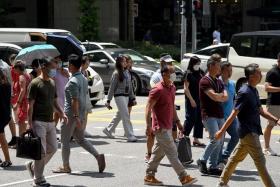Culture change vital for 4-day work week: HR consultant
Issue more pertinent in Singapore; Kiwi company's 4-day work week trial a success
For most employed adults around the world, the work day is defined by the 9am to 6pm grind that is replicated five days a week.
But a company in New Zealand threw convention out the window earlier this year when it tried out a four-day work week - meaning employees were paid for 40 hours of work despite having to work only 32 hours.
The two-month experiment by trust and estate planning company Perpetual Guardian went viral after it released findings saying that its employees were happier, more focused and producing the same amount of work despite the 20 per cent reduction in working hours.
The trial comes amid a growing desire around the world for better work-life balance through rethinking work culture and emphasising work done rather than hours worked.
According to human resource (HR) experts and recruitment managers here, work-life balance and flexible work schemes are becoming increasingly pertinent within companies, even though they have yet to see a company in Singapore go to the extent of testing out a four-day work week.
According to director of talent, rewards and performance at HR solutions company Aon Singapore, Mr Vikas Verma, work-life balance is one of the five most common conversations during employee engagements, second only to compensation and career progression.
"Though a lot of companies are now catching on to this, the feedback we get from employees is that companies need to provide more support and investment to back up their flexible-work policies, so that employees can actually enjoy more work-life balance," he said.
In Singapore, many companies have now begun to offer flexible work arrangements, for example by allowing employees to work from home one day a week.
Mr Manick Singh, 44, who started his own IT consultancy two years ago, is one such employer. He allows his staff of six to work out of the office at least one day a week, as long as the rest of the team is told in advance.
"We try and schedule all our team meetings in the early part of the week so that everyone has the option of some free days when they can work from home and are not forced to come into the office."
Still, according to freelance financial planner and HR consultant Shan Li, there needs to be inherent changes in Singapore's work culture.
Said the 57-year-old: "Unfortunately in Singapore, working long hours is often considered the marker of working hard, even though most people are productive for only a few hours a day. For a shorter work week to be successful, you need middle and upper management to rethink the way they manage teams, such as looking at productivity over absolute hours."
Get The New Paper on your phone with the free TNP app. Download from the Apple App Store or Google Play Store now


